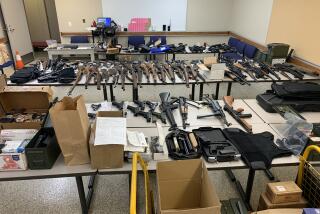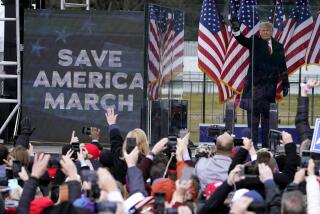Courts May Sometimes Bar Witness : Justices Approve Rejection in Order to Punish Attorneys
- Share via
WASHINGTON — Courts may sometimes bar defense witnesses from testifying at criminal trials in order to punish the defendants’ lawyers, the Supreme Court ruled today.
By a 5-3 vote, the justices upheld a Chicago man’s attempted-murder conviction and 10-year sentence even though one would-be defense witness was not allowed to testify because of a defense lawyer’s procedural violation.
Writing for the court, Justice John Paul Stevens said barring a witness from a trial is justified--and does not violate a defendant’s fair-trial rights--if a defense lawyer’s violations are aimed at gaining some tactical advantage or to conceal a plan to present phony testimony.
“It is plain that (this) case fits into the category of willful misconduct in which the severest sanction is appropriate,” Stevens wrote.
Ray Taylor was in an Aug. 6, 1981, street fight in Chicago involving himself and some friends on one side and Jack Bridges and some of Bridge’s relatives on the other. Bridges was shot during the fight.
Taylor was not indicted until 22 months later, when he was charged with attempted murder. His trial, in large part, amounted to a test of witness credibility.
While witnesses for the state testified that they saw Taylor shoot Bridges, two defense witnesses said they saw Bridges’ brother accidentally shoot him while trying to protect him.
The day before the defense witnesses were to begin testifying--well into the trial--Taylor’s lawyer sought court permission to put Alfred Wormley on the stand. Wormley was ready to testify that he saw two of Bridges’ relatives with pistols the day of the fight.
The judge, saying the lawyer had committed a “blatant violation of discovery rules” by failing to notify the court and the state’s prosecutors of the proposed testimony sooner, refused to let Wormley take the stand.
Taylor was eventually convicted and sentenced to 10 years in prison.
In today’s decision, Stevens said the record in Taylor’s case indicates that his lawyer was deliberately seeking a tactical advantage in not listing Wormley as a potential witness earlier.
Stevens was joined by Chief Justice William H. Rehnquist and Justices Byron R. White, Sandra Day O’Connor and Antonin Scalia. Justices William J. Brennan, Thurgood Marshall and Harry A. Blackmun dissented.
In other action, the court:
--Ordered further lower court study of whether states may ban bookstores from displaying some sexually explicit material where children might see it. By an 8-0 vote, the justices ordered the Virginia Supreme Court to determine how sweeping that state’s ban is intended to be. The ruling bars enforcement of the law pending the state court review.
--Rejected an appeal by California school officials seeking more than $12 million in additional federal aid. The court, without comment, left intact a rule limiting how much so-called impact aid schools receive from the federal government for educating children whose parents live or work on federal land exempt from local property taxes.
--Turned down an appeal by a former postmaster general who said he was fired for trying to foil a kickback scheme. The justices, without comment, let stand a ruling that federal courts are powerless to reinstate Paul N. Carlin.
More to Read
Sign up for Essential California
The most important California stories and recommendations in your inbox every morning.
You may occasionally receive promotional content from the Los Angeles Times.













